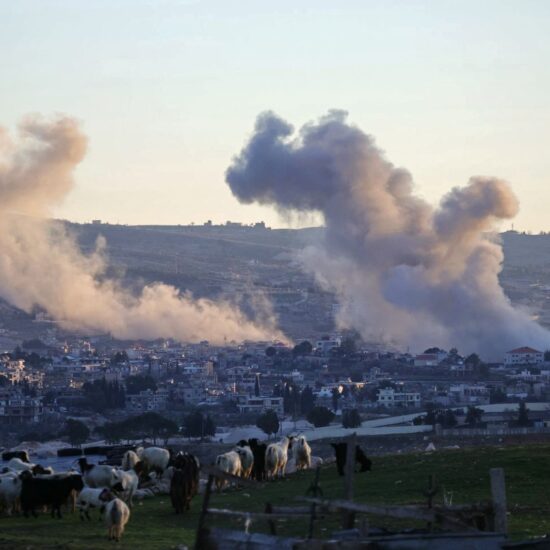
The Assad regime's sudden collapse reshapes Syria and its regional influence, offering hope for displaced Syrians and cautious optimism for Lebanon's stability.
The Assad family’s half-century grip on power in Syria disintegrated with startling speed as rebel forces launched a decisive offensive from their northern enclave. In a matter of days, they seized Aleppo and several key cities before advancing unopposed into Damascus. By Sunday, government forces had crumbled, and President Bashar al-Assad, who had ruled for nearly a quarter of a century, fled the country.
The collapse of Assad’s regime abruptly ended Syria’s 14-year war, which began in 2011 with his violent crackdown on peaceful protests during the Arab Spring. Years of devastation had left the conflict in a prolonged stalemate, but the rapid rebel victory revealed the fragility of Assad’s rule and his reliance on Iran and Russia—supporters who failed to intervene when it mattered most.
Ahmad Al Sharaa, the Islamist leader who revitalized the rebellion, emerged as a pivotal figure in orchestrating this stunning turnaround. Backed in part by Turkey and fueled by Sunni jihadist forces, the opposition’s success has reshaped the regional landscape. Iran’s ambitions to arm its allies across the Middle East face new obstacles, while Russia risks losing its strategic naval base on the Mediterranean.
For millions of displaced Syrians scattered in camps across Lebanon, Turkey, and Jordan, the fall of the regime offers a glimmer of hope for returning home. The war, which claimed hundreds of thousands of lives and left cities in ruins, had crippled the Syrian economy under the strain of international sanctions. Now, after years of stagnation, the conflict has ended in a stunning and unexpected conclusion.
The collapse of Bashar al-Assad’s regime in Syria is bound to have ripple effects across Lebanon, but experts remain divided on the extent of its impact. While some see the downfall of Syria’s leadership as a chance for Lebanon to address its own deeply rooted challenges, others caution that the future remains uncertain. For now, the shift in Syria’s political landscape offers cautious optimism for stability in the region.
Syria has long played a pivotal role in Lebanon’s political fate, often influencing the rise and fall of factions within its borders. If Damascus perceives Lebanon’s leaders as adversaries, it can undermine them politically—or even physically. Conversely, when Syria chooses to back a group, as it once did with Hezbollah, it can empower that faction to dominate Lebanon’s political and security apparatus.
Syrian-Lebanese relationships
The Syrian opposition’s push southward from Idlib coincided with a ceasefire between Israel and Hezbollah, a development many analysts interpret as a sign of Iran’s waning influence in Lebanon following a yearlong war with Israel. In Lebanon, the fall of Bashar al-Assad’s regime is being closely watched, as experts believe it will have far-reaching consequences for the region.
In Beirut and other parts of Lebanon, celebrations erupted at news of Assad’s downfall, reflecting lingering resentment toward Syria’s decades-long dominance over Lebanese domestic and foreign affairs—a grip that only loosened with Syria’s military withdrawal in 2005. Political analysts argue that the weakening of Iran’s axis of resistance, a network that includes Hezbollah, marks a significant shift in Lebanon’s internal power dynamics, potentially reducing Tehran’s influence on the country’s politics and security.
While some see Assad’s fall as an opportunity for a fresh chapter in Lebanon-Syria relations, others warn of the risks involved. The collapse of Assad’s regime has also exposed vulnerabilities in Iran’s regional influence project. Although Tehran remains a key player, its diminished capacity leaves it increasingly vulnerable to Israeli attacks. The coming months will be critical as the country navigates this new chapter in its neighbor’s turbulent history.
The Executive Director of the Arab NGO Network for Development (ANND), Ziad Abdel Samad, told NOW that the recent regional developments present Lebanon with a unique opportunity to re-establish its sovereignty and address longstanding governance issues. According to Abdel Samad, the fall of the Assad regime and the weakening of Iranian influence have shifted the dynamics in Lebanon and the region, creating a favorable environment for reform and stronger state institutions.
“It has been challenging for Lebanon to achieve sovereignty under the oppressive regime in Syria,” Abdel Samad said. “There was coordination between the Syrian and Lebanese security systems to suppress every Lebanese attempt to attain independence and sovereignty from 2000 until now.”
Now, Lebanon is presented with an opportunity to reclaim its independence and focus on building a state governed by the rule of law, he said.
He also stressed the importance of addressing the issue of non-state weapons and fully implementing international agreements such as UNSC Resolution 1701 and the Taif Agreement to ensure stability. “The disarmament of Hezbollah and the unification of arms under state control are crucial steps toward strengthening governance and security,” he added.
A rosie outcome?
The collapse of the Syrian regime has coincided with a period of significant upheaval across the Middle East, marking what could be a critical juncture for Lebanon, according to Lina Tannir, a Senior Lecturer at the American University of Beirut. “We are witnessing tectonic shifts in the region, and these changes will undoubtedly have a major impact on Lebanon,” she told NOW.
Tannir emphasized the longstanding interdependence between Lebanon and Syria, stemming from shared borders, historical ties, and the movement of people. “The relationship between the two countries is deeply intertwined. Any change in Syria will inevitably have a significant impact on Lebanon,” she explained.
The lecturer pointed out that the fall of a “murderous regime” in Syria, regardless of the unknown future leadership, offers an opportunity for both countries. “No matter who brought the change, it will be better than what existed before,” Tannir remarked. She called for Lebanon to use this moment to rebuild its state institutions on a solid foundation, emphasizing that “a strong government would eliminate many of the worries we face.”
Tannir also addressed the broader implications of the regime’s collapse, including the diminished influence of Hezbollah. “This is a chance for Lebanon to restart from scratch on the right footing, with no meddling from either side,” she noted. She stressed the importance of establishing a strong Lebanese state to prevent adverse effects from the regional transformations.
On the economic front, Tannir highlighted how Lebanon stands to benefit from Syria’s reconstruction. “Rebuilding Syria will inevitably reflect positively on Lebanon, particularly in areas like trade and infrastructure,” she said. However, she also pointed out the challenges posed by Syria’s recent status as a narcotic state and the smuggling activities that have plagued Lebanon, adding that recent efforts to halt these practices signal progress.
Tannir also stressed the need for a Lebanese president capable of navigating the upcoming changes and implementing key decisions, such as fully adhering to United Nations Security Council Resolution 1701. “We need a president who ensures that all military power is centralized within the Lebanese army. No armed group can be stronger than the state,” she asserted, adding that this would also strengthen Lebanon’s judiciary and institutional framework.
Looking ahead, Tannir painted a cautiously optimistic picture. “With a strong state, we can resolve critical issues like refugees, reconstruction, and financial reform through proper institutions. This is a pivotal moment for Lebanon to rebuild and thrive,” she said.
Solving our own issues first
Abdel Samad agreed that there is an urgency in electing a president who can assert Lebanon’s sovereignty and navigate the country’s political, economic, and regional challenges. However, he stressed the importance of the upcoming president’s ability to “restore Lebanon’s regional identity positively and reintegrate the country into the international and Arab communities.”
On economic issues, Abdel Samad pointed to years of compounding crises exacerbated by Israel’s attacks on infrastructure in Dahye, the South, and the Bekaa. “Our economy remains in a dire state,” he said, highlighting the destruction of factories, markets, and critical infrastructure. “Even positive signs, like remittances from the diaspora, won’t resolve the crisis without genuine economic reforms and a new banking system.”
Abdel Samad also called for revisiting agreements with Syria, noting the country’s transitional phase and the uncertain future of its governance. “We need to develop trade and border agreements to serve the interests of both nations,” he stated, emphasizing the importance of curbing smuggling and reestablishing cooperative frameworks for mutual benefit.
In conclusion, Lebanon is at a critical juncture, with internal crises closely tied to regional shifts. Experts emphasize the need for leadership that can restore sovereignty, reform institutions, and stabilize the economy. The collapse of Syria’s regime and reduced Iranian influence created a new phase for Lebanon. The future seems uncertain, but experts seem optimistic about it. Success depends on proactive governance, adherence to agreements like UNSCR 1701, and structural economic reforms.








